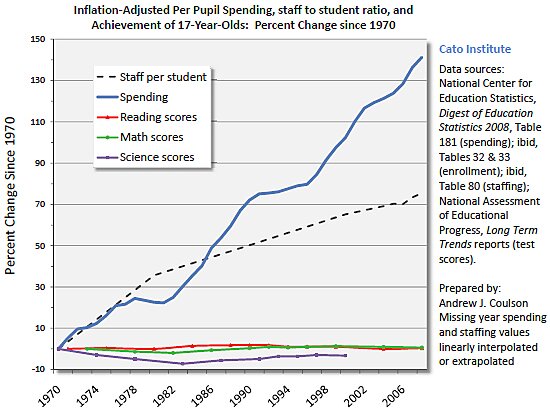In a recent New York Times column (“The Uneducated American”), Paul Krugman writes that, “for the past 30 years our political scene has been dominated by the view that any and all government spending is a waste of taxpayer dollars.” As a result, Krugman continues, U.S. education has been “neglected” and “has inevitably suffered.”
Readers who put their trust in Krugman might thus conclude that per pupil spending has stagnated or declined. In reality, as the chart below reveals, it has more than doubled since 1970, after adjusting for inflation.
Paul Krugman may not be an “uneducated American,” but he’s certainly a badly misinformed one.
Much more troubling is the fact that Krugman and the Times are spreading this misinformation on a grand scale. And that got me thinking about Jon Stewart. When Time magazine recently asked Americans to name their most trusted newscaster, the comic and Daily Show host won in a landslide. Many pundits have taken this as a sign of the Apocalypse, worrying that so many Americans are getting their facts from a presumptively unreliable source. But is the Daily Show really less reliable than Paul Krugman and the New York Times?
To find out how they stack up on this particular question, I Googled the Daily Show’s website for any discussion of education spending. The most relevant hit was an exchange in the show’s on-line forum. In it, a commenter claims that spending per pupil has risen by a factor of 10 since 1945, after adjusting for inflation. That’s not too far off the mark. The actual multiple is just under 8. So folks who get their facts from the Daily Show’s website will be better informed on this subject than those who trust the Nobel Prize winning New York Times economist.
Not only is Krugman wrong to claim that public schools have been financially “neglected,” he is wrong to imagine that higher public school spending spurs economic growth – which is the central point of his column. Better academic achievement does help the economy – but, as the chart above illustrates and many scholarly studies have demonstrated, higher public school spending does not improve achievement. And by raising taxes without improving achievement, it may actually slow economic growth.
Media elites have been wringing their hands over the collapse in public demand for their products, over the two thirds of Americans who now doubt their credibility, and over the fact that more people now get their information from the Daily Show’s website than the New York Times’s.
Perhaps the media might attract more readers and rebuild trust if they were to stop publishing material less reliable than the blog discussions on a comedy show’s website. Just a thought.

